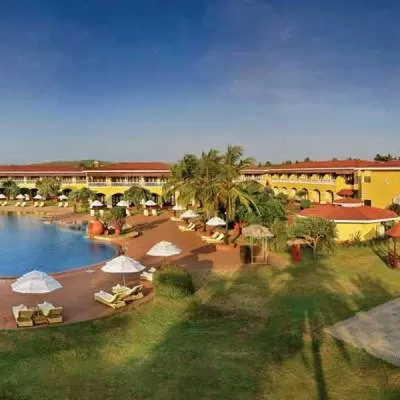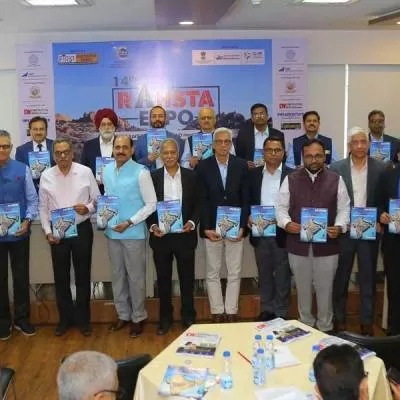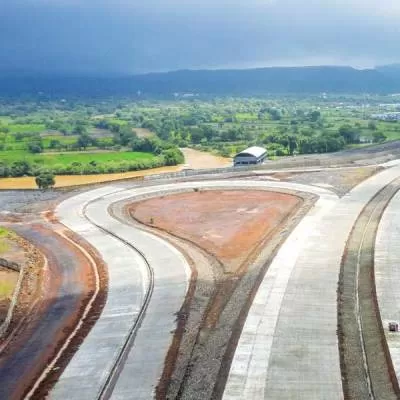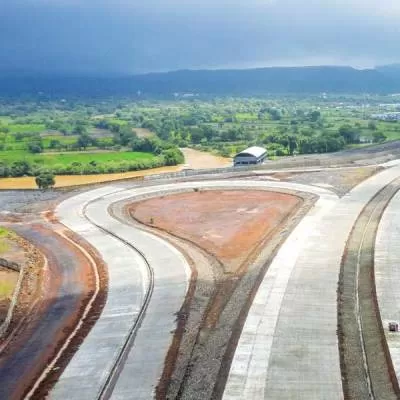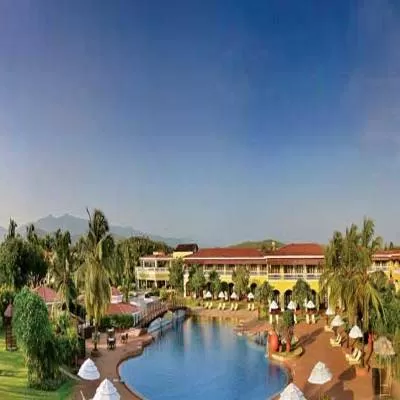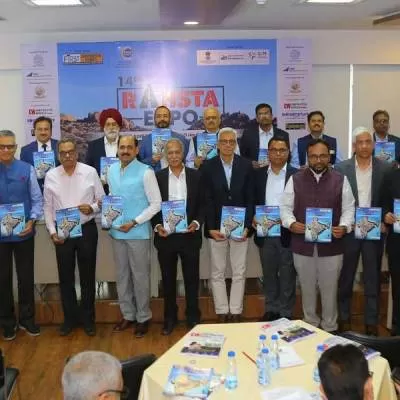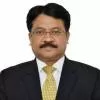- Home
- Infrastructure Transport
- ROADS & HIGHWAYS
- I always focus on direct dialogue
I always focus on direct dialogue
Ashwini Bhide, Joint Metropolitan Commissioner, MMRDA
Construction may still be a male-dominated world but women are beginning to storm the bastion by combining administrative and technical expertise with soft skills and a sky-high EQ. Here's the first of a series on these remarkable achievers.
Her career graph speaks not just of success and excellence but also of responsibility, stick-to-itiveness and sheer
commitment to her profession. Ashwini Bhide, Joint Metropolitan Commissioner, MMRDA, has served as joint secretary to the Governor of Maharashtra as well as chief executive officer, Zila Parishad at Sindhudurg and Nagpur and additional divisional commissioner, Nagpur. A topper among women candidates in the All India List and 9th among overall candidates, this IAS officer is soft-spoken, yet firm in her convictions and abilities to take on more. In a conversation with Falguni Padode, Group Managing Editor, she opens up on her career, the industry and finding the perfect work-life balance. Excerpts….
You have been in your current post for over two years. What are your responsibilities?
My responsibility is to deal with projects across the spectrum, from transportation to public sanitation. In certain parts of our metro project, my responsibility is to give right of way to the concessionaire, which is the most challenging. For the monorail, the entire supervision, monitoring and management is my responsibility. I am also looking after many road projects in the city, including many elevated roads especially the airport links, i.e. the Sahar elevated road, and a port link from Mumbai Port Trust that will take you directly outside the city. We have many flyovers, road over-bridges and skywalks for pedestrians.
I also look over regional water supply, a recent venture, and the regional land field sites that we are trying to develop. We are trying to create an e-waste facility. We want to do these projects as PPPs. We have appointed the transaction advisors. In addition, MMRDA has done a massive public sanitation campaign. In the past one-and-a-half years, we have built about 23,000 public toilets in the entire Mumbai metropolitan region. We made this work through other NGOs and formed community-based organisations.
I also have to take care of rehabilitation and resettlements as we need to shift so many people for all these projects. We have created a housing stock of over almost 33 colonies and have shifted 42,000 families already. We still have a way to go. There are many encroachers but on humanitarian grounds, we have decided to allot housing to those living there prior to 2000. It is a big challenge to identify those who are eligible.
How do you keep abreast of the latest technology that is now intrinsic to projects?
I don't have any technological knowledge but my main job is to bring all these people together and facilitate a proper decision. So I try to understand what the problem is. For example, in the monorail initially we had a problem casting the beam, which is essential to the entire structure. Technically, everybody was sound but somehow they were not able to arrive at a decision regarding the problem. Everybody had different opinions and there were different agencies, our consultant, the contractor's consultant, the civil and the systems partners with their own consultants and designers. My job was to make them sit together, try to understand the problem and resolve it. At times, technical people try to design everything from an idealistic point of view that may not be practically possible. So you have to make them think out of the box. There are many constraints. Then you ask them for alternatives and make it work. It is a process; these solutions don't come on their own.
Does your past experience come into play for this job or is this a completely new experience?
Well yes, this is a completely new experience because I am dealing with a completely different subject. But there is always a basic string that flows across all these centres: to display common sense, be just, be sensitive, and understand the issues before offering solutions. At times people do not listen to others and just start talking. Even in Zilla Parishad when I was dealing with rural development, I was doing rural infrastructure, minor dams, water conservation projects, rainwater harvesting. I had to tackle thousands of villages and their problems.
There, each project was for a few lakh; at MMRDA it is worth a few thousand crore. But the problems were the same. Implementation problems are always the same. You need to try and resolve matters with a positive frame of mind and no unnecessary ego issues. I had no problems communicating even with the lowest functionary without having a sense of hierarchy. I do not hesitate in talking to the actual encroachers. At times, you get work delegated but I do not do that. Most of my staff is also very happy about this style of functioning and they give their best because of this.
Another issue is MMRDA dealing with MCGA; MMRDA dealing with the collector's office…they always feel that if it is MMRDA's project why should they do it? But I try to give them a feeling that it is a joint project, it is a project for Mumbai and all the authorities involved in the development of Mumbai. MMRDA may be implementing it but they all are there; I cannot do anything without their help. So I always focus on direct dialogue instead of writing letters and waiting for their response.
Which governors have you worked under?
I worked with three governors: Mohammed Fazal, SM Krishna and SC Jamir. It was a great experience working in Raj Bhavan as far as my understanding of the state budget and the planning process goes. We used to draft all the directives to the state government; how to ensure equitable distribution of funds among the three regions of Vidarbha, Marathwada and the rest of Maharashtra. That was the main job. That also helped me a lot because again it was skill building that helps you in further revising policies.
In a role that calls for so much facilitation and communication, has being a woman been an added plus?
Yes. I think so. It is one's personality that matters and when you discuss personality, gender also comes into play. Generally I feel women have more patience and the ability to multitask. Here, you cannot give orders and get them executed; it will not happen. In a city like Mumbai, when you are working on a metro, on a 7-8 m wide road, without closing it down and ensuring the work is done on time, it is not an easy job. You cannot just give orders and expect everyone else to function because in a complex project it gets difficult for people to understand their own role too. There are hundreds of players and if even one person does not communicate properly, lots of things happen. In such things you require a lot of patience, the ability to hear people; you must try to understand their problems and give them solutions. Some people have the ability to find solutions and they become your big assets. I have collected many people over a period of time and I use them whenever required. At times, people are good but they cannot find solutions. But once you give them the solutions, they are the ones who implement it. So you have to see the ability of the person. These are times when being a woman helps me. You fight on various fronts otherwise also, and it gives you the patience and the ability to go through it.
How do you handle so many transfers?
My husband is a doctor and was the chief officer in MHADA till recently. Now he is planning to quit. I have two children Jahnavi and Malhar; they are eight and seven years old respectively. In the initial years, when I was in Sindhudurg, my husband was in Kolhapur. We then put in a request and they posted us to Nagpur. Then we took the conscious decision of coming to Mumbai prematurely because we wanted to be together. In Mumbai, there are many more posts so you can be together. When the children were younger I was with Raj Bhavan, so it was easier.
With such long work hours, how do you maintain a work-life balance?
The work hours are long. But we manage because of my husband's support; my mother-in-law is also a rock-solid support for both of us. She is a very good manager so I do not have to worry about household matters. The three of us have a very good understanding and I also do not stretch it much. We try to avoid other social commitments because we have to give time to our kids too. Sometimes, my office hours stretch from 8:45 am to 8:45 pm. Travelling also takes time. My children are older now and are able to appreciate what I do.
You have been an achiever and topper all your life. Do you have a long-term game plan for yourself?
I would only like to work with the government because I feel that there is a need for people with good intentions and the capacity to work which can make a lot of changes. As you know, in the IAS you can go across sectors. Whichever sector I go into, I would like to bring about changes in whatever manner possible for me. Then, I would like a skill upgrade at some point in time, maybe getting a degree in management or finance. I am going with the flow right now. But while doing so, I will try to do it with full commitment and devotion and try to give my best and get the best out of whatever situation is given to me.
How do you deal with the power play that comes with the government or any organisation?
It depends on your nature. I don't get into these things. I just believe in doing my work sincerely and with focus.
Who is your role model?
No single person – I try to learn from everyone. Now that I have met you, I will definitely try and learn something from you! Whichever officer I have worked with, I have tried to pick up some style of his functioning that I was most impressed with.
Ashwini Bhide, Joint Metropolitan Commissioner, MMRDA Construction may still be a male-dominated world but women are beginning to storm the bastion by combining administrative and technical expertise with soft skills and a sky-high EQ. Here's the first of a series on these remarkable achievers. Her career graph speaks not just of success and excellence but also of responsibility, stick-to-itiveness and sheer commitment to her profession. Ashwini Bhide, Joint Metropolitan Commissioner, MMRDA, has served as joint secretary to the Governor of Maharashtra as well as chief executive officer, Zila Parishad at Sindhudurg and Nagpur and additional divisional commissioner, Nagpur. A topper among women candidates in the All India List and 9th among overall candidates, this IAS officer is soft-spoken, yet firm in her convictions and abilities to take on more. In a conversation with Falguni Padode, Group Managing Editor, she opens up on her career, the industry and finding the perfect work-life balance. Excerpts…. You have been in your current post for over two years. What are your responsibilities?My responsibility is to deal with projects across the spectrum, from transportation to public sanitation. In certain parts of our metro project, my responsibility is to give right of way to the concessionaire, which is the most challenging. For the monorail, the entire supervision, monitoring and management is my responsibility. I am also looking after many road projects in the city, including many elevated roads especially the airport links, i.e. the Sahar elevated road, and a port link from Mumbai Port Trust that will take you directly outside the city. We have many flyovers, road over-bridges and skywalks for pedestrians. I also look over regional water supply, a recent venture, and the regional land field sites that we are trying to develop. We are trying to create an e-waste facility. We want to do these projects as PPPs. We have appointed the transaction advisors. In addition, MMRDA has done a massive public sanitation campaign. In the past one-and-a-half years, we have built about 23,000 public toilets in the entire Mumbai metropolitan region. We made this work through other NGOs and formed community-based organisations. I also have to take care of rehabilitation and resettlements as we need to shift so many people for all these projects. We have created a housing stock of over almost 33 colonies and have shifted 42,000 families already. We still have a way to go. There are many encroachers but on humanitarian grounds, we have decided to allot housing to those living there prior to 2000. It is a big challenge to identify those who are eligible. How do you keep abreast of the latest technology that is now intrinsic to projects?I don't have any technological knowledge but my main job is to bring all these people together and facilitate a proper decision. So I try to understand what the problem is. For example, in the monorail initially we had a problem casting the beam, which is essential to the entire structure. Technically, everybody was sound but somehow they were not able to arrive at a decision regarding the problem. Everybody had different opinions and there were different agencies, our consultant, the contractor's consultant, the civil and the systems partners with their own consultants and designers. My job was to make them sit together, try to understand the problem and resolve it. At times, technical people try to design everything from an idealistic point of view that may not be practically possible. So you have to make them think out of the box. There are many constraints. Then you ask them for alternatives and make it work. It is a process; these solutions don't come on their own. Does your past experience come into play for this job or is this a completely new experience?Well yes, this is a completely new experience because I am dealing with a completely different subject. But there is always a basic string that flows across all these centres: to display common sense, be just, be sensitive, and understand the issues before offering solutions. At times people do not listen to others and just start talking. Even in Zilla Parishad when I was dealing with rural development, I was doing rural infrastructure, minor dams, water conservation projects, rainwater harvesting. I had to tackle thousands of villages and their problems. There, each project was for a few lakh; at MMRDA it is worth a few thousand crore. But the problems were the same. Implementation problems are always the same. You need to try and resolve matters with a positive frame of mind and no unnecessary ego issues. I had no problems communicating even with the lowest functionary without having a sense of hierarchy. I do not hesitate in talking to the actual encroachers. At times, you get work delegated but I do not do that. Most of my staff is also very happy about this style of functioning and they give their best because of this. Another issue is MMRDA dealing with MCGA; MMRDA dealing with the collector's office…they always feel that if it is MMRDA's project why should they do it? But I try to give them a feeling that it is a joint project, it is a project for Mumbai and all the authorities involved in the development of Mumbai. MMRDA may be implementing it but they all are there; I cannot do anything without their help. So I always focus on direct dialogue instead of writing letters and waiting for their response. Which governors have you worked under?I worked with three governors: Mohammed Fazal, SM Krishna and SC Jamir. It was a great experience working in Raj Bhavan as far as my understanding of the state budget and the planning process goes. We used to draft all the directives to the state government; how to ensure equitable distribution of funds among the three regions of Vidarbha, Marathwada and the rest of Maharashtra. That was the main job. That also helped me a lot because again it was skill building that helps you in further revising policies. In a role that calls for so much facilitation and communication, has being a woman been an added plus?Yes. I think so. It is one's personality that matters and when you discuss personality, gender also comes into play. Generally I feel women have more patience and the ability to multitask. Here, you cannot give orders and get them executed; it will not happen. In a city like Mumbai, when you are working on a metro, on a 7-8 m wide road, without closing it down and ensuring the work is done on time, it is not an easy job. You cannot just give orders and expect everyone else to function because in a complex project it gets difficult for people to understand their own role too. There are hundreds of players and if even one person does not communicate properly, lots of things happen. In such things you require a lot of patience, the ability to hear people; you must try to understand their problems and give them solutions. Some people have the ability to find solutions and they become your big assets. I have collected many people over a period of time and I use them whenever required. At times, people are good but they cannot find solutions. But once you give them the solutions, they are the ones who implement it. So you have to see the ability of the person. These are times when being a woman helps me. You fight on various fronts otherwise also, and it gives you the patience and the ability to go through it. How do you handle so many transfers?My husband is a doctor and was the chief officer in MHADA till recently. Now he is planning to quit. I have two children Jahnavi and Malhar; they are eight and seven years old respectively. In the initial years, when I was in Sindhudurg, my husband was in Kolhapur. We then put in a request and they posted us to Nagpur. Then we took the conscious decision of coming to Mumbai prematurely because we wanted to be together. In Mumbai, there are many more posts so you can be together. When the children were younger I was with Raj Bhavan, so it was easier. With such long work hours, how do you maintain a work-life balance?The work hours are long. But we manage because of my husband's support; my mother-in-law is also a rock-solid support for both of us. She is a very good manager so I do not have to worry about household matters. The three of us have a very good understanding and I also do not stretch it much. We try to avoid other social commitments because we have to give time to our kids too. Sometimes, my office hours stretch from 8:45 am to 8:45 pm. Travelling also takes time. My children are older now and are able to appreciate what I do. You have been an achiever and topper all your life. Do you have a long-term game plan for yourself? I would only like to work with the government because I feel that there is a need for people with good intentions and the capacity to work which can make a lot of changes. As you know, in the IAS you can go across sectors. Whichever sector I go into, I would like to bring about changes in whatever manner possible for me. Then, I would like a skill upgrade at some point in time, maybe getting a degree in management or finance. I am going with the flow right now. But while doing so, I will try to do it with full commitment and devotion and try to give my best and get the best out of whatever situation is given to me. How do you deal with the power play that comes with the government or any organisation? It depends on your nature. I don't get into these things. I just believe in doing my work sincerely and with focus. Who is your role model?No single person – I try to learn from everyone. Now that I have met you, I will definitely try and learn something from you! Whichever officer I have worked with, I have tried to pick up some style of his functioning that I was most impressed with.


